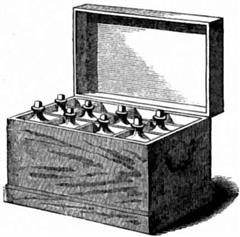A Midnight Flight
An account of the leaving of a
plantation on the Mississippi River
By Eliza Ripley (1862)
THE only exact
date I can remember, and that I never forget, was the 17th of December.
The weather was
warm for the season, a thick fog hung over the river, obscuring objects only a
few yards distant. As I stood by the window, in the early morning, completing my
toilet, the white, misty curtain rolled up like a scroll, revealing a fleet of
gunboats. Far as the eye could reach, up and down and around our point, the
river was bristling with gayly flagged transports, anchored mid-stream, waiting
for the dissipation of the mist to proceed. In a twinkling all was excitement
with the hurry and bustle of our immediate departure.
 A
breakfast eaten “on the fly”as it were, a rushing here and there, and packing of
necessaries for our journey, God only knew whither, we did not care where, so we
escaped a repetition of scenes that had made us old before our time, and life a
constant excitement that was burning us up. William was despatched to the city
on a tour of observation. He returned, to report ten thousand men and the most
warlike demonstrations that the darky's genius could invent; pickets to be
stationed away beyond Arlington, and all of us to be embraced within the lines
and made to “toe de mark.” “Mars Jim, and every white man what harbored a
Confederate soldier de time of de fight, was to be tuk prisoner.” The more
William told, the more he remembered to tell; and, long before he was through
with his recital, I was perplexed, bewildered, and almost distracted.
A
breakfast eaten “on the fly”as it were, a rushing here and there, and packing of
necessaries for our journey, God only knew whither, we did not care where, so we
escaped a repetition of scenes that had made us old before our time, and life a
constant excitement that was burning us up. William was despatched to the city
on a tour of observation. He returned, to report ten thousand men and the most
warlike demonstrations that the darky's genius could invent; pickets to be
stationed away beyond Arlington, and all of us to be embraced within the lines
and made to “toe de mark.” “Mars Jim, and every white man what harbored a
Confederate soldier de time of de fight, was to be tuk prisoner.” The more
William told, the more he remembered to tell; and, long before he was through
with his recital, I was perplexed, bewildered, and almost distracted.
The negro men
were summoned from their quarters to help load the wagon. We put in cooking
utensils, some dishes and plates, bedding and a small mattress, a few kegs and
boxes of necessary provisions, a trunk of clothing, some small bags and
bundles―that was all.
The mules safely
locked in the stable, the harnesses all ready to slip on, extra straps and ropes
thrown into the wagon―too excited to sleep, we threw ourselves on our beds for
the last time; too tired to talk, sore at heart; too worn out to weep. There we
lay in a fitful and uneasy slumber. In the dead stillness of the night there
came a low tap at our chamber door. “Mars Jim!” My husband was on his feet with
a bound. “Your niggers is all gone to de Yankees; de pickets is on our place,
and dey done told your niggers you would be arrested at daylight.” The speaker
was head sugar maker on an adjoining plantation, himself a slave. “Call Dominick
and tell him to get my buggy ready while I put on some clothes,” was the only
response. I lighted the candle and hurried my husband off―while he whispered
directions for me to join him immediately after breakfast at the house of a
neighbor, five miles back of us, which he could speedily reach by going through
the woods, and to have one of the men drive the wagon, and one drive the
ambulance through the longer but better wagon-road.
That was all―and
he was gone. I did not lie down again, but wandered around in an aimless sort of
way, too distracted to do a useful or sensible thing.
At the first
appearance of dawn I aroused William to prepare breakfast, and Charlotte to get
the table ready. Before the children were awake, I was down at the stable,
having William and Willy hitch up the teams. I saw with half an eye that William
was not in sympathy with our plans, and knew intuitively that my husband
distrusted him. He who had been my husband's valet in his gay bachelor days and
our confidential servant, our very aid and help in all my bright married life,
had had his poor woolly head turned by that one trip to town, and asserted his
independence at the first shadow of provocation. William failing me, I knew I
must seek other help.
 Being
ready and eager to start, I immediately went down to the quarters, a half-mile
distant; there I waited, going from cabin to cabin, and walked to the
dwelling-house and back again. Willy stood by the hitched-up teams, and Sabe,
near by, held the baby in her arms, while little Henry clung to her skirts. Then
back to the quarters. This man “had a misery in his back ―had had it ever since
the crevasse;” that man “never druv in his life―didn't I know he was de
engineer?” Another man “wouldn't drive old Sall―she was de balkiest mule on de
place; you won't get a mile from here 'fore she takes de contraries, and won't
budge a step.”
Being
ready and eager to start, I immediately went down to the quarters, a half-mile
distant; there I waited, going from cabin to cabin, and walked to the
dwelling-house and back again. Willy stood by the hitched-up teams, and Sabe,
near by, held the baby in her arms, while little Henry clung to her skirts. Then
back to the quarters. This man “had a misery in his back ―had had it ever since
the crevasse;” that man “never druv in his life―didn't I know he was de
engineer?” Another man “wouldn't drive old Sall―she was de balkiest mule on de
place; you won't get a mile from here 'fore she takes de contraries, and won't
budge a step.”
I could have sat
down and wept my very heart out. It was long past noon; the harnessed mules had
to be fed, and William made out to say: “We had better take a little snack, and
give it up; if we stayed home, Mars Jim would come back; the Yankees didn't have
nothin' 'gin him.”
At last old Dave
said he “warn't no hand wid mules, but he 'lowed he could tackle old Sal till
she balked.” There was no time for bargaining for another driver now. I caught
at Dave's offer before he knew it, only stopping long enough to bid all the
deluded creatures a hasty goodby.
Dave was hurried
by my rapid steps back to the stable, and Sabe came out with the tired children.
Just as I thought we were fairly off, William announced, “Sence you was gone a
Yankee gunboat is cum down, and I see it's anchored 'tween us and Kernel
Hickey's.” A peep around the corner of the house confirmed the truth of his
statement. Hastily grasping a carpet-bag, lying ready packed in the ambulance, I
ascended to my bedroom, took from it two large pockets quilted thick with jewels
which I secured about my person, while Charlotte put the breakfast forks and
spoons in the bottom of the bag.
When I returned
to the teams, everybody was standing about, apparently waiting to see what “Miss
'Lize” would do now. Summoning every effort to command a voice whose quaver must
have betrayed my intense emotion, I directed Willy to mount the wagon, a few
last baskets and packages were tossed into the ambulance, and Henry's little
pony tied behind. I got in, then the little ones and Sabe; Dave shambled into
his place in front; the curtain cutting off the driver's seat was carefully
rolled up, so I could have an unobstructed view, and Willy was told to lead the
way.
So I rode away
from Arlington, leaving the sugarhouse crowded to its utmost capacity with the
entire crop of sugar and molasses of the previous year for which we had been
unable to find a market within “our lines,” leaving cattle grazing in the
fields, sheep wandering over the levee, doors and windows flung wide open,
furniture in the rooms, clothes too fine for me to wear now hanging in the
armoires, china in the closets, pictures on the walls, beds unmade, table
spread. It was late in the afternoon of that bright, clear, bracing day,
December 18, 1862, that I bade Arlington adieu forever.
___________
Ripley, Eliza “A Midnight Flight,” The
Romance of the Civil War, New York: The McMillan Company, 1903
 visits since 03/01/2004.
visits since 03/01/2004.
Page updated
05/25/2006
 A
breakfast eaten “on the fly”as it were, a rushing here and there, and packing of
necessaries for our journey, God only knew whither, we did not care where, so we
escaped a repetition of scenes that had made us old before our time, and life a
constant excitement that was burning us up. William was despatched to the city
on a tour of observation. He returned, to report ten thousand men and the most
warlike demonstrations that the darky's genius could invent; pickets to be
stationed away beyond Arlington, and all of us to be embraced within the lines
and made to “toe de mark.” “Mars Jim, and every white man what harbored a
Confederate soldier de time of de fight, was to be tuk prisoner.” The more
William told, the more he remembered to tell; and, long before he was through
with his recital, I was perplexed, bewildered, and almost distracted.
A
breakfast eaten “on the fly”as it were, a rushing here and there, and packing of
necessaries for our journey, God only knew whither, we did not care where, so we
escaped a repetition of scenes that had made us old before our time, and life a
constant excitement that was burning us up. William was despatched to the city
on a tour of observation. He returned, to report ten thousand men and the most
warlike demonstrations that the darky's genius could invent; pickets to be
stationed away beyond Arlington, and all of us to be embraced within the lines
and made to “toe de mark.” “Mars Jim, and every white man what harbored a
Confederate soldier de time of de fight, was to be tuk prisoner.” The more
William told, the more he remembered to tell; and, long before he was through
with his recital, I was perplexed, bewildered, and almost distracted.
